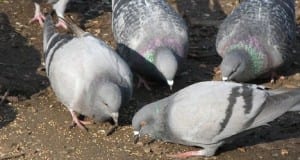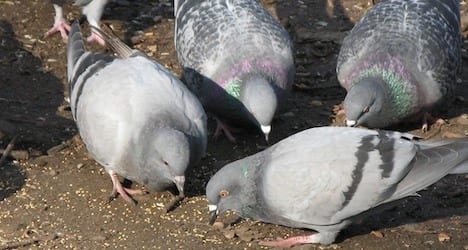
by Pigeon Patrol | Sep 11, 2023 | Bird Spike, Pigeon Spikes, Pigeons, Pigeons in the News, Raccoons, Sparrows, UltraSonic Bird Control
SASKATOON — The City of Saskatoon says about 2,300 pigeons have been killed as part of a project to rehabilitate a major bridge.
The city says the dead birds have been removed from the Senator Sid Buckwold Bridge along with 635,000 kilograms of pigeon poop.
It says the birds and the poop had to go because they posed a health risk and the weight of the droppings — equivalent to 356 medium-sized vehicles — could compromise the structure of the bridge.
The city says a specialized pest control company was hired to trap and humanely euthanize the pigeons and barriers are now in place to prevent birds from roosting in the same areas again.
Killing the birds, removing the droppings and building the barriers cost $800,000.
The bridge was completed in 1966 and spans the South Saskatchewan River. (CTV Saskatoon, The Canadian Press)
Source
Pigeon Patrol Products & Services is the leading manufacturer and distributor or bird deterrent (control) products in Canada. Pigeon Patrol products have solved pest bird problems in industrial, commercial, and residential settings since 2000, by using safe and humane bird
deterrents with only bird and animal friendly solutions. At Pigeon Patrol, we manufacture and offer a variety of bird deterrents, ranging from Ultra-flex Bird Spikes with UV protection, Bird Netting, 4-S Bird Gel and the best Ultrasonic and audible sound devices on the market today.
Voted Best Canadian wholesaler for Bird Deterrent products ten years in a row.
Contact us at 1 877-4-NO-BIRD,(604) 585-9279 or visit our website at www.pigeonpatrol.ca
Pigeon/Pigeon Patrol / Pigeons Roosing / Vancouver Pigeon Control / Bird Spikes / Bird Control / Bird Deterrent / PIgeon Deterrent / Surrey Pigeon Control / Pest / Seagull deterrent / Vancouver Pigeon Blog / Birds Inside Home / Pigeons in the cities / Ice Pigeons / What to do about pigeons / sparrows, Damage by Sparrows, How to Keep Raccoons Away, Why Are Raccoons Considered Pests / De-fence / Pigeon Nesting / Bird Droppings / Pigeon Dropping / woodpecker control / Professional Bird Control Company / Keep The Birds Away / Birds/rats/seagull/pigeon/woodpecker/dove/sparrow/pidgeon control/pidgeon problem/pidgeon control/flying rats/pigeon problems/ bird netting/bird gel/bird spray/bird nails/bird guard
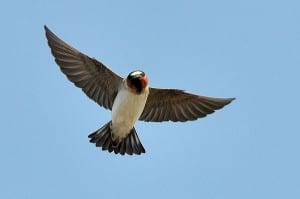
by Pigeon Patrol | Sep 11, 2023 | 4-S Gel Bird repellent, Animal Deterrent Products, Bird Deterrent Products, Bird Law, Bird Netting
Since European settlement, many granivorous birds of northern Australia’s savanna landscapes have declined. One such example, the partridge pigeon (Geophaps smithii), has suffered a significant range contraction, disappearing from at least half of its pre-European range. Multiple factors have been implicated in this decline, including the loss of traditional Aboriginal burning practices, grazing by large exotic herbivores and predation by feral cats (Felis catus). While populations of partridge pigeon on the Tiwi Islands may be particularly important for the long-term persistence of this species, they too may be at risk of decline. However, as a reliable method to detect this species has not yet been developed and tested, we lack the ability to identify, at an early stage, the species’ decline in a given location or region. This severely limits our capacity to make informed management decisions. Here, we demonstrate that the standard camera trapping approach for native mammal monitoring in northern Australia attained an overall probability of detecting partridge pigeon greater than 0.98. We thus provide a robust estimate of partridge pigeon site occupancy (0.30) on Melville Island, the larger of the two main Tiwi Islands. The information presented here for the partridge pigeon represents a critical first step towards the development of optimal monitoring programmes with which to gauge population trajectories, as well as the response to remedial management actions. In the face of ongoing biodiversity loss, such baseline information is vital for management agencies to make informed decisions and should therefore be sought for as many species as possible.

Source
Pigeon Patrol Products & Services is the leading manufacturer and distributor or bird deterrent (control) products in Canada. Pigeon Patrol products have solved pest bird problems in industrial, commercial, and residential settings since 2000, by using safe and humane bird
deterrents with only bird and animal friendly solutions. At Pigeon Patrol, we manufacture and offer a variety of bird deterrents, ranging from Ultra-flex Bird Spikes with UV protection, Bird Netting, 4-S Bird Gel and the best Ultrasonic and audible sound devices on the market today.
Voted Best Canadian wholesaler for Bird Deterrent products ten years in a row.
Contact us at 1 877-4-NO-BIRD,(604) 585-9279 or visit our website at www.pigeonpatrol.ca
Pigeon/Pigeon Patrol / Pigeons Roosing / Vancouver Pigeon Control / Bird Spikes / Bird Control / Bird Deterrent / PIgeon Deterrent / Surrey Pigeon Control / Pest / Seagull deterrent / Vancouver Pigeon Blog / Birds Inside Home / Pigeons in the cities / Ice Pigeons / What to do about pigeons / sparrows, Damage by Sparrows, How to Keep Raccoons Away, Why Are Raccoons Considered Pests / De-fence / Pigeon Nesting / Bird Droppings / Pigeon Dropping / woodpecker control / Professional Bird Control Company / Keep The Birds Away / Birds/rats/seagull/pigeon/woodpecker/dove/sparrow/pidgeon control/pidgeon problem/pidgeon control/flying rats/pigeon problems/ bird netting/bird gel/bird spray/bird nails/bird guard
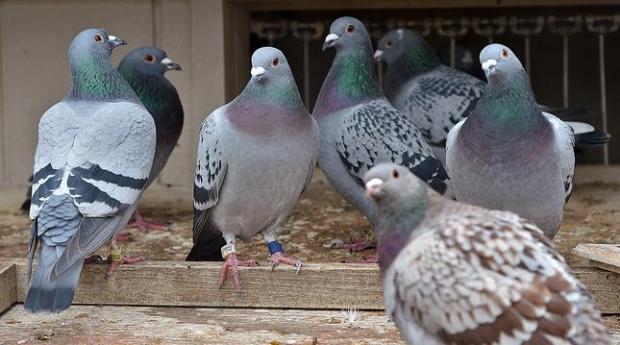
by Pigeon Patrol | Sep 7, 2023 | 4-S Gel Bird repellent, Animal Deterrent Products, Bird Deterrent Products, Bird Law, Bird Netting, Bird Spikes
Pigeons are always on the lookout for a source of food and buildings with plenty of high nooks and crannies to roost and nest in, and your factory might just fit the bill.
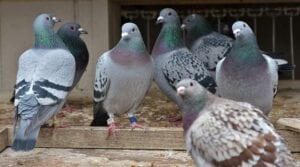
But if pigeons get into your factory, it’s a serious problem. These pest birds and their guano (poo) carry and spread some nasty diseases, and they can also damage property. This is bad news for any business, but if food is manufactured, packaged, and stored in your factory, it can be disastrous.
Before your reputation and your profits take a serious hit, read our advice on how you can keep pigeons out of your factory.
How to prevent pigeons from getting into your factory
First, eliminate any sources of food
Any sources of food will be very attractive to pigeons, and eliminating them will make your factory less desirable to roost or nest in. Keep your factory scrupulously clean and don’t leave food ingredients or waste lying around, inside or outside of the premises.
It’s also a good idea to talk to nearby businesses if their poor waste management or housekeeping practices are attracting pest birds to the vicinity.
Second, use deterrents
When you are trying to prevent pigeons from nesting or roosting in or on your property, deterrents like bird spikes, bird wire, and netting can be effective at keeping them at bay.
Third, fix up your factory
If there are holes in your factory roof or walls that you haven’t got around to fixing, you could inadvertently be providing pigeons with the perfect nesting place. Make sure you fix them up-deterring pigeons is all about making your factory much less attractive to them.
Finally, deal with the guano
As we mentioned earlier, pigeon droppings can contain some harmful bacteria, so we would recommend that you don’t try to clean it up yourself.
If pest pigeons have made a mess of your factory, call in the professionals. We will blast away guano with the right equipment and products so your premises is clean, safe, and hygienic again.
Do I need professional pigeon control for my factory?
As birds are protected by the Wildlife and Countryside Act 1981, it’s illegal to poison or shoot them if you don’t have a license. If you put poison down, you could harm other birds and end up in legal trouble. And not only that, if you’re a food business, you won’t be able to use toxic bird control methods anyway as you could contaminate your product.
If you hire professional pest control, you can get your pest problem dealt with fast. We can deal with any existing infestation, install effective bird-proofing and deterrents, and give you expert advice on preventing any problems in the future.
To protect your business, customers, and your reputation, professional pigeon control is your best bet.
Source
Pigeon Patrol Products & Services is the leading manufacturer and distributor or bird deterrent (control) products in Canada. Pigeon Patrol products have solved pest bird problems in industrial, commercial, and residential settings since 2000, by using safe and humane bird
deterrents with only bird and animal friendly solutions. At Pigeon Patrol, we manufacture and offer a variety of bird deterrents, ranging from Ultra-flex Bird Spikes with UV protection, Bird Netting, 4-S Bird Gel and the best Ultrasonic and audible sound devices on the market today.
Voted Best Canadian wholesaler for Bird Deterrent products ten years in a row.
Contact us at 1 877-4-NO-BIRD,(604) 585-9279 or visit our website at www.pigeonpatrol.ca
Pigeon/Pigeon Patrol / Pigeons Roosing / Vancouver Pigeon Control / Bird Spikes / Bird Control / Bird Deterrent / PIgeon Deterrent / Surrey Pigeon Control / Pest / Seagull deterrent / Vancouver Pigeon Blog / Birds Inside Home / Pigeons in the cities / Ice Pigeons / What to do about pigeons / sparrows, Damage by Sparrows, How to Keep Raccoons Away, Why Are Raccoons Considered Pests / De-fence / Pigeon Nesting / Bird Droppings / Pigeon Dropping / woodpecker control / Professional Bird Control Company / Keep The Birds Away / Birds/rats/seagull/pigeon/woodpecker/dove/sparrow/pidgeon control/pidgeon problem/pidgeon control/flying rats/pigeon problems/ bird netting/bird gel/bird spray/bird nails/bird guard
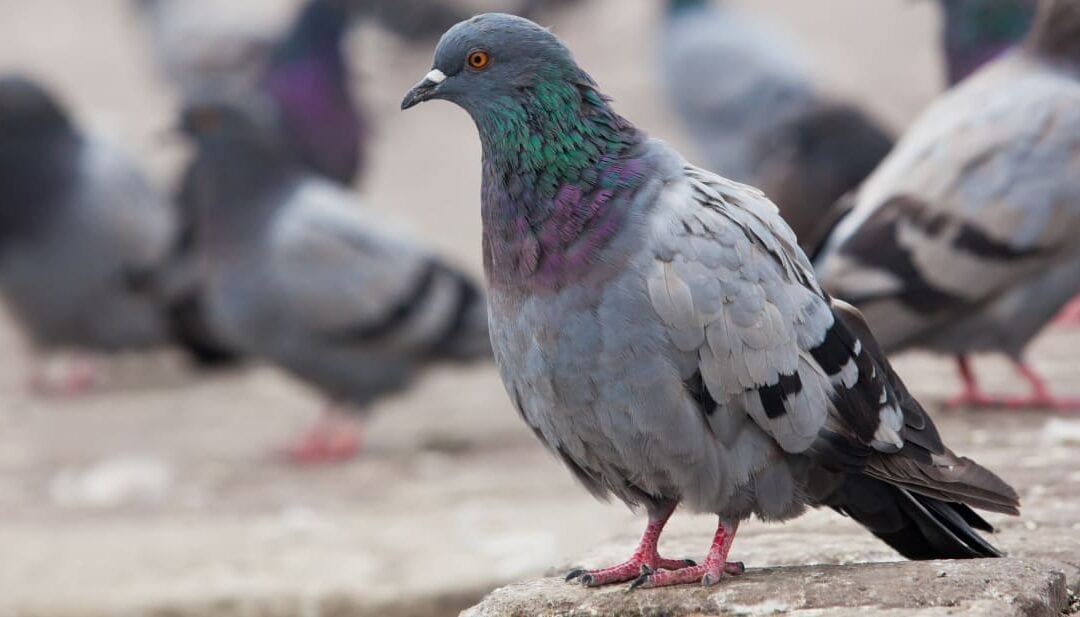
by Pigeon Patrol | Sep 7, 2023 | Bird Spike, Pigeon Control, Pigeon Droppings, Pigeon Patrol's Services, Pigeon Predators, Pigeon Spikes, Pigeons
Nature-loving homeowners like to put out feeders and plant certain flowers and shrubs, to lure birds into their backyards. That’s because birds not only lend more vigor and melody to the life of a garden, but they are also responsible for pollination and pest control.
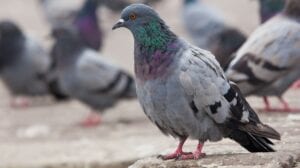
Indeed, birds-caping – or designing your garden to entice local birds – has become increasingly popular among home gardeners these days.
But not every gardener wants birds sauntering onto their garden plots. Pigeons will devour entire heads of cabbage in the afternoon. Crows destroy corn crops by the acre in the countryside, and bluejays will loot your berry bushes almost completely bare of fruit.
The Right Way to Keep Birds Out of Your Vegetable Garden
Still, the wise gardener understands that birds perform an important function in the ecosystem. We recognize why we should ensure that avian populations don’t dwindle any faster than they are dwindling now.
So, below are seven ways to protect your backyard harvests without harming unwanted birds.
1. Scarecrows
Scarecrows, of course, are an obvious solution against birds. But if your makeshift sentry has been posted in the same spot for an extended period now, then birds will have already concluded that he’s harmless.
You need to move your scarecrow’s post a few times around each week. You have to change his clothes, too, to convince the birds that he’s not just a stationary defense tactic, but an actual, mobile threat.
Some gardeners use reflective objects such as old compact discs to keep local birds away. You should also move and rearrange those frequently. Birds catch on surprisingly quickly despite the connotations of the term “bird-brained.”
2. Butterfly Netting
Barriers are among the most effective ways to deter birds from your garden. Butterfly netting protects crops from birds while allowing smaller beneficial insects access to your crops to ensure pollination.
Experts suggest that you keep your netting pulled taught, and use netting with holes smaller than one centimeter to avoid injuring birds.
Be sure you invest in high-quality, UV-resistant netting materials. They may be a bit more expensive, but higher-quality netting will last a lifetime. Cheaper netting tends to fray and deteriorate, becoming a potentially dangerous snag for birds.
3. Chicken Wire
Charles Barnard, an English ironmonger, invented chicken wire in 1844 as a cheap and easy way to keep small animals and poultry penned in one area. You can use the same principle and material to keep birds out of your vegetable plots.
Pin chicken wire to the ground to protect newly-planted seeds or freshly-sown tubers from birds or even chickens scratching and pecking at the soil. As your seedlings start to grow, you can lift the wire off the ground on stakes for additional protection.
4. Garden Fleece
Gardeners often install garden fleece to protect crops from frost in cold weather months, but you can also use it year-round to shield your crops from birds. Drape the fine, white material over your vegetable patch to keep the birds in your neighborhood from harvesting your greens.
Weigh the sides down with rocks or pegs. You can always roll back the fleece when harvest season comes around.
5. Protective Plants
Pigeons, be they wood or rock doves, are rapacious devourers of vegetables in the cabbage family. They are quite persistent and will return to your patch every day until your entire crop is gone. If you don’t have a devoted terrier to shoo them away, you need another plan.
If you are simply not a fan of netting and cages, you can try confusing pigeons by surrounding your cabbage patch with annuals. Plant a dense barrier of calendulas, nemophila, cornflowers, field poppies, and other shorter-growing wildflowers around your plot.
The look is pleasing, inconspicuous and, as a deterrent against pigeons, the strategy does work. Pigeons do not like to wade through lush flowers. They are naturally wary of what may lurk underneath.
6. Toy Predators
Decoy predators – such as toy owls, falcons, or other birds of prey – can help deter birds from ravaging your garden’s harvests. However, like the scarecrow, if these stationary decoys are not relocated often, birds will soon learn that they are harmless.
Moving your toy owls and decoy predators around in the garden will keep neighborhood birds from swooping in to consume your harvest. Decoys that move or make a sound are even better at deterring birds.
7. Stick Barriers
Push sticks and small twigs into the ground around your vegetable patch to create a small forest of sticks. Birds will likely notice the menacing sticks barring their way instead of the vegetables you want to protect.
Source
Pigeon Patrol Products & Services is the leading manufacturer and distributor or bird deterrent (control) products in Canada. Pigeon Patrol products have solved pest bird problems in industrial, commercial, and residential settings since 2000, by using safe and humane bird
deterrents with only bird and animal friendly solutions. At Pigeon Patrol, we manufacture and offer a variety of bird deterrents, ranging from Ultra-flex Bird Spikes with UV protection, Bird Netting, 4-S Bird Gel and the best Ultrasonic and audible sound devices on the market today.
Voted Best Canadian wholesaler for Bird Deterrent products ten years in a row.
Contact us at 1 877-4-NO-BIRD,(604) 585-9279 or visit our website at www.pigeonpatrol.ca
Pigeon/Pigeon Patrol / Pigeons Roosing / Vancouver Pigeon Control / Bird Spikes / Bird Control / Bird Deterrent / PIgeon Deterrent / Surrey Pigeon Control / Pest / Seagull deterrent / Vancouver Pigeon Blog / Birds Inside Home / Pigeons in the cities / Ice Pigeons / What to do about pigeons / sparrows, Damage by Sparrows, How to Keep Raccoons Away, Why Are Raccoons Considered Pests / De-fence / Pigeon Nesting / Bird Droppings / Pigeon Dropping / woodpecker control / Professional Bird Control Company / Keep The Birds Away / Birds/rats/seagull/pigeon/woodpecker/dove/sparrow/pidgeon control/pidgeon problem/pidgeon control/flying rats/pigeon problems/ bird netting/bird gel/bird spray/bird nails/bird guard
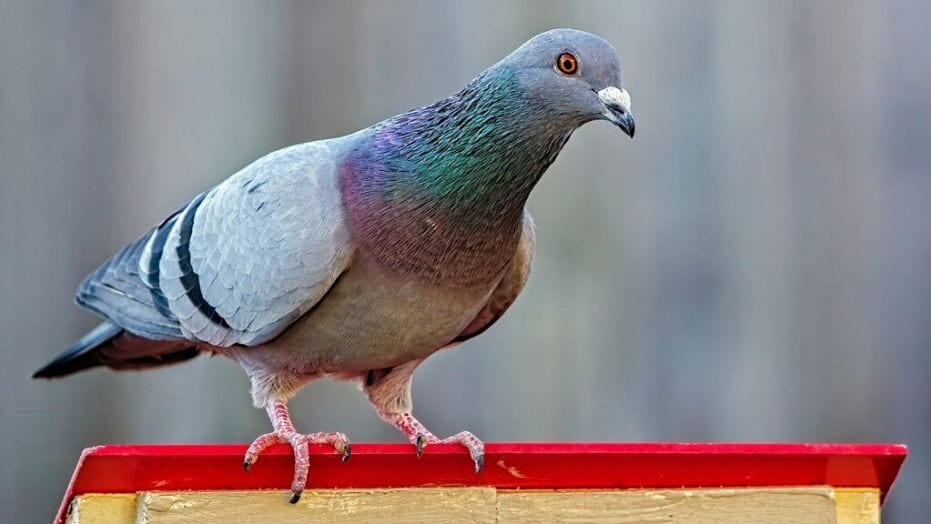
by Pigeon Patrol | Sep 7, 2023 | history of pigeons, MBCA, pet bird, Pigeon Control, Pigeon Droppings, Pigeon Patrol's Services, Pigeon Predators
We all are well aware of the fact that how films, web series, and TV serials have romanticized the idea of symbolizing birds such as pigeons and sparrows as a symbol of love and peace. However, the truth is completely different from what we see on the screen. If these birds become unpaid tenants of your little balcony, you are surely going to encounter the nuisance they create. Thus, many homeowners opt for Sparrow Netting or Pigeon Netting to keep them at bay.
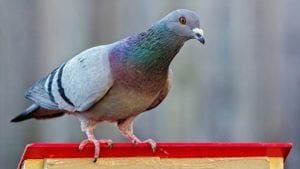
In addition, during the summer season, it becomes extremely important to place pigeon netting for balconies to get rid of all the chaos they bring with them. You may wonder how these little pests can cause substantial damage to your family’s health and also to your property. Well, they can and that is the reason why various residential and industrial spaces in rural and urban areas rely on anti bird netting services.
With that being said, this write-up is specially dedicated to discussing why anti bird netting becomes crucial during the Indian summer season. The comprehensive guide will also shed some light on the key features of HiCare’s bird netting in Pune, Mumbai, and other Indian cities.
Birds are Dirty Beings
Yes, believe it or not, they are. And, if you don’t you can check out the surface of a car parking in the open space or benches of the park. Now, just imagine that a bunch of birds are enjoying the shade under your balcony. Once they leave, you are likely to spot their droppings. It is a treat for all the balcony gardeners as a large amount of their dropping can harm vegetation.
Birds Can Cause Illness
Diseases such as pigeon ornithosis, encephalitis, and salmonella food poisoning have all been linked to pigeons. However, determining the true incidence of illness transmission from pigeons to humans is problematic. Disease outbreaks that may be traced back to pigeon flocks are uncommon. Hence, another strong reason for subscribing to bird netting in Pune, Mumbai, or any other metropolitan city of India.
Pigeon excrement contains the causal agent of histoplasmosis, a systemic fungal illness that affects the human respiratory tract if allowed to accumulate for several years. Histoplasmosis can be lethal in extreme cases. Pigeons’ external parasites include a variety of mites, fleas, ticks, and bugs.
More than anything else, pigeons can be a threat to human safety. Thus, the elimination of feeding, watering, roosting, and nesting sites is important during summer, winter, or any Indian season. As birds pose serious concerns to gardeners and property owners, bird netting services can act as a barrier to letting them in your sweet home. With that being said, here are four benefits of Bird Netting installation in summer. Scroll down to take a brief look at each!
Top 4 Benefits of Bird Netting
- Long-Term Protection
- Durable and Sturdy
- Cost-Effective
- Simple to Use
- Disease Prevention
- Environmentally Friendly
- Low Maintenance
1. Long-Term Protection
During summer, birds often come in their numbers to attack your balcony causing significant damage to the surroundings. To counter this, the net is an effective way to offer the right protection to complete your space from bird damage.
2. Durable and Sturdy
Nets are made of the strongest, highest-quality materials, come in a variety of shapes and sizes, and are UV-stabilized. Some nets have been estimated to last up to several years. Anti-bird netting pays off in terms of durability, which is important in any worthwhile investment. The setup is basic and straightforward.
3. Cost-Effective
Nets are made of the strongest, highest-quality materials, come in a variety of shapes and sizes, and are UV-stabilized. Some nets have been estimated to last up to several years. Anti-bird netting pays off in terms of durability, which is essential in any worthwhile investment.
4. Simple to Use
The netting is exceptionally simple to use and easy to install. The process is hassle-free and professionals can do it within a given timeframe. Once installed properly, it does not require any external force to come into action.
Many reasons and benefits can lure more homeowners to install pigeon netting for balconies. However, finding the best professionals that give Bird Netting Services in Mumbai or any Indian city could be a bit difficult. On the flip side, it is not impossible either. If your browser history is filled with the query – Bird Netting Mumbai, HiCare has a solution for you.
5. Disease Prevention
Bird droppings can contain harmful pathogens and bacteria. By keeping birds away from areas where people live and work, bird netting reduces the risk of diseases transmitted through contact with bird droppings. This is especially crucial in urban environments.
6. Environmentally Friendly
Bird netting is considered an environmentally friendly bird control method because it does not harm the birds. Instead, it provides a physical barrier that discourages birds from accessing certain areas without causing them harm. This makes it a humane and sustainable solution.
7. Low Maintenance
Once bird netting is properly installed, it requires minimal maintenance. Routine inspections to check for damage and repairs as needed are typically the only maintenance tasks required. This saves time and effort compared to other bird control methods.
Source
Pigeon Patrol Products & Services is the leading manufacturer and distributor or bird deterrent (control) products in Canada. Pigeon Patrol products have solved pest bird problems in industrial, commercial, and residential settings since 2000, by using safe and humane bird
deterrents with only bird and animal friendly solutions. At Pigeon Patrol, we manufacture and offer a variety of bird deterrents, ranging from Ultra-flex Bird Spikes with UV protection, Bird Netting, 4-S Bird Gel and the best Ultrasonic and audible sound devices on the market today.
Voted Best Canadian wholesaler for Bird Deterrent products ten years in a row.
Contact us at 1 877-4-NO-BIRD,(604) 585-9279 or visit our website at www.pigeonpatrol.ca
Pigeon/Pigeon Patrol / Pigeons Roosing / Vancouver Pigeon Control / Bird Spikes / Bird Control / Bird Deterrent / PIgeon Deterrent / Surrey Pigeon Control / Pest / Seagull deterrent / Vancouver Pigeon Blog / Birds Inside Home / Pigeons in the cities / Ice Pigeons / What to do about pigeons / sparrows, Damage by Sparrows, How to Keep Raccoons Away, Why Are Raccoons Considered Pests / De-fence / Pigeon Nesting / Bird Droppings / Pigeon Dropping / woodpecker control / Professional Bird Control Company / Keep The Birds Away / Birds/rats/seagull/pigeon/woodpecker/dove/sparrow/pidgeon control/pidgeon problem/pidgeon control/flying rats/pigeon problems/ bird netting/bird gel/bird spray/bird nails/bird guard

